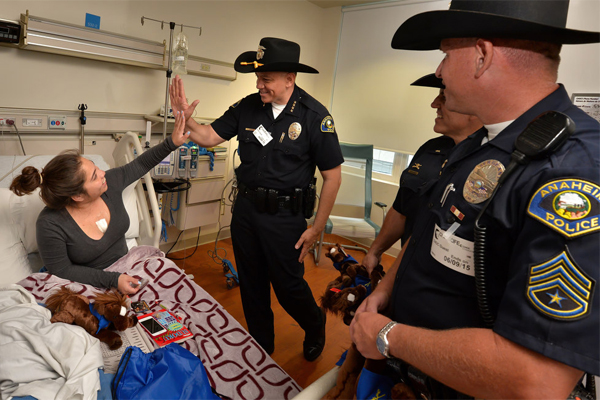From Behind the Badge APD
Maria Guillen, 5, laughs as she clutches her new Anaheim Police Mounted Enforcement Unit toy horse given to her by Officer Cherie Hill, left, during a visit to CHOC. Photo by Steven Georges/Behind the Badge OC
By Greg Hardesty
The posse of men and women in black hats ambled down the hospital hallway with voices hushed, the spurs on the heels of their riding boots creating a melody of soft jingles that echoed off the pristine floor.
Behind the doors of three floors they visited were children: some recovering from surgeries, some stricken by illnesses, some battling cancer — a place where there’s no such thing as providing too much love.
A 6-year-old girl in a playroom on the post-op floor of CHOC Children’s looked up at the stranger in black as he approached her with a gift.
“What are you?” the girl asked.
“I’m a policeman.”
Officer Eric Anderson then handed Amelia Smith a plush horse — chocolate brown with a blue-and-yellow scarf that read, “Anaheim Police Mounted Unit.”
Anderson asked Amelia what she would name her horse.
The young Disney fan didn’t hesitate.
“The name,” Amelia declared, “should be Elsa.”
In a first-ever venture, 10 officers on the APD’s Mounted Enforcement Unit — joined by Chief Raul Quezada and Deputy Chief Julian Harvey — moseyed on up to Orange recently to cheer up young patients at the pediatric hospital.
They handed out nearly 75 plush horses to kids in playrooms and in hospital beds, at times tearing up as they visited some of the most gravely ill youngsters.
“We forget how blessed we are and how much we take for granted,” said Sgt. Rodney Duckwitz, one of the main organizers of the June 9 visit.
“I feel it’s our responsibility to look for new ways to engage the community,” Duckwitz said. “We all felt that visiting CHOC would be a fantastic opportunity to serve the community in a different way.”
Officer Eric Anderson said visiting patients at CHOC was a no-brainer for the officers, several of whom did so on their day off. He said the effort was part of the APD’s push to take a more philanthropic approach to community outreach.
Quezada handed out chief’s coins to the patients, telling them that if he ran across them in public and they weren’t carrying the coin, they would owe him a Coke.
“It’s great to see the smiles on the kids’ faces,” Quezada said.
The APD’s Mounted Enforcement Unit is celebrating its 20th anniversary this year. It is part of a regional mounted unit of about 50 officers from seven law enforcement agencies that train together each month and sometimes work together, typically at large events.
Cheryl Timmons, a volunteer with the APD Mounted Enforcement Unit, was responsible for getting the plush horses made. The officers dug into their own pockets to pay for them, in addition to collecting some money from friends and family.
The officers split into teams to visit children on the third (post-op), fourth (medical surgery) and fifth (oncology) floors of CHOC Children’s — a visit led by Amber Chavez, a special programs coordinator at CHOC Children’s.
“Want to see a horse?” Deputy Chief Harvey asked a shy 4-year-old girl in a playroom.
“Oh my gosh, he has a surprise for you!” volunteer Kathy Green told the girl.
“Pet him,” Harvey urged the girl. “He’s soft. He likes you.”
Said Green to the several officers in the playroom: “I love the hats!”
Parents of the children who interacted with the cops were just as happy as the kids.
“This helps take a little bit of pressure off of me,” said Leanne Smith, mother of Amelia, who is at CHOC Children’s for three weeks to learn how to eat orally instead of through a feeding tube.
“It’s great they (APD) are doing this,” said Smith, of Lake Havasu City. “This is so cool.”
When the two-hour visit ended, the officers said they planned to be back — maybe, this time, with real horses outside for patients to visit.
“This was a very humbling experience,” Duckwitz said. “Hopefully it was as beneficial to the kids as it was to us.”













